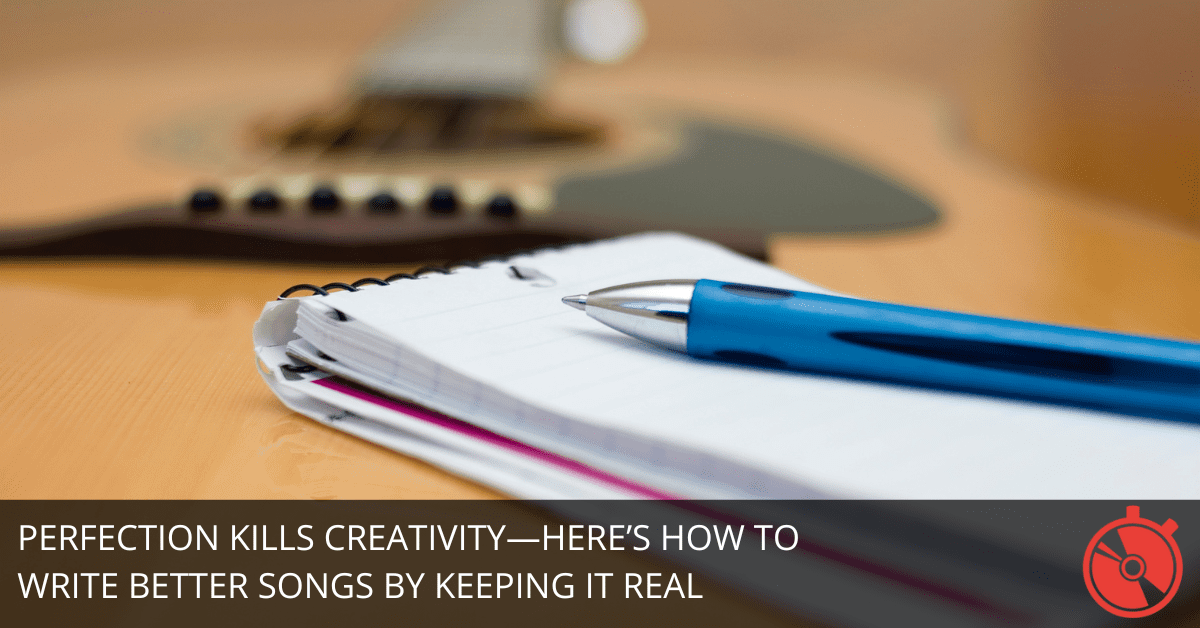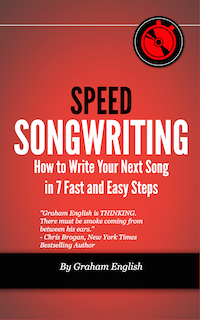
We’ve all been there—staring at a blank page, feeling like we’re just not good enough to write a hit song.
Maybe you compare yourself to your favorite artists, telling yourself they’re more talented, more trained, or just better.
Here’s the truth: they’re not.
The real secret to songwriting success isn’t being the best musician, the most technically skilled, or even the most creative.
It’s knowing how to “suck just enough.”
Let me explain.
When you focus too much on perfection—chasing complex musical theories, flawless playing, or Grammy-level production—you lose the raw magic that makes a song work. Perfection gets in the way of ideas. It stops you from writing anything at all.
Instead, balance just enough skill with creativity. Stay good enough to get the job done but raw enough to stay inspired.
Here’s how to embrace the power of “sucking just enough” and start writing better songs today.
1. Stop Overcomplicating Your Music
Simplicity is the secret weapon of great songwriters.
Most hit songs are built on simple, proven chord progressions like 1-5-6-4. They’re easy to play, easy to sing, and easy for listeners to latch onto. You don’t need advanced jazz chords or ten-finger piano voicings. You need chords that feel right.
Here’s what to do next:
Start with the basics. Play with progressions like C-G-Am-F or D-A-Bm-G. Don’t overthink them. Strum them on a guitar or loop them on a piano until you find something that moves you.
Think of these progressions like rice. They’re the foundation you can build anything on. Once you have the base, layer it with a simple melody and lyric idea.
Example? Taylor Swift’s “Love Story” follows a basic progression, but the melody and lyrics shine. Simplicity wins.
2. Write First, Fix Later
The worst thing you can do while writing a song? Stop to fix mistakes.
The moment you start self-editing—“Does this lyric sound dumb?” or “Is this melody too basic?”—you slam the brakes on creativity.
Here’s the better way:
Get messy. Write like no one’s watching. Whether you’re humming random syllables or spitting out lyrics that barely make sense, keep going.
Your first version will suck—and that’s okay. Let it.
When you come back to it later with fresh ears, you’ll see the sparks of magic buried in the mess. Maybe it’s a killer hook. Maybe it’s a line that punches harder than you thought.
Clean it up after. That’s when you can tweak the lyrics, polish the melody, and adjust the structure.
The process is to write first and fix later. Not perfect first.
3. Focus on Feeling, Not Theory
Your audience doesn’t care about diminished sevenths or augmented chords. They care about how the song makes them feel.
That’s why you don’t need to be a virtuoso to write a hit. Some of the most timeless songs are built on raw emotion, not technical brilliance.
Here’s what to do:
When you write, focus on vibe and feeling. Play a simple chord loop and hum until you stumble onto a melody that makes you go, “Oh, that’s it.” If you feel it, your listener will, too.
Not sure where to start?
Pick an emotion: joy, heartbreak, nostalgia. Then try to “soundtrack” it. If you’re writing about heartbreak, slow things down. Use minor chords. If it’s joy, stick to major keys and brighter rhythms.
For example, listen to “Let It Be” by The Beatles. The chords are basic, but the song oozes comfort and hope. It’s all about feeling.
4. Embrace Imperfection (It Sounds Cooler Anyway)
We live in an era where “perfect” often feels fake. Polished, overproduced songs can sound expensive—but not real.
Listeners want authenticity. Sometimes, the rough edges are what make a song relatable.
Here’s how to embrace imperfection:
- Use a lo-fi recording: Record a guitar straight into your laptop mic. Don’t worry about getting studio-level quality.
- Leave in small mistakes: Maybe you hit a slightly off-note, or your voice cracks. Keep it. Those moments add character.
- Limit your tools: Don’t drown in endless plugins or samples. Use fewer options and make them work for you.
Think of artists like Billie Eilish or Jack Johnson. Their recordings feel human. The sound isn’t perfect, but the vibe is.
5. Trust Your Taste Over Your Talent
You don’t need to be the most skilled musician in the room—you need to have good taste.
Good taste means recognizing when something feels fresh, catchy, or cool. It’s the ability to hear when a melody clicks or a lyric hits hard.
Here’s how to develop your taste:
- Listen intentionally: Break down your favorite songs. Ask, “Why do I love this hook? Why does this lyric hit me in the gut?”
- Steal like an artist: Don’t copy, but borrow ideas. If you love the rhythm in a Kendrick Lamar song, use it as inspiration for your own.
- Write often: The more you write, the more you refine your instincts. You’ll start recognizing what works and what doesn’t faster.
Great songwriters trust their taste over their technical ability. You should, too.
6. Set a Time Limit: Write Fast, Edit Slow
Creativity thrives under pressure. When you give yourself too much time to write, you second-guess everything.
Set a timer for 30 minutes and force yourself to write a complete verse, chorus, or melody.
You’ll be surprised at how much you can create when you don’t have time to overthink.
After the timer goes off, step away. Give it a day. Then come back and see what works.
Think of it like sculpting: The first draft is your block of clay. You shape and refine it later.
7. Remember: Good Enough Is Better Than Nothing
The biggest mistake aspiring songwriters make? They don’t finish.
They abandon ideas because they’re “not good enough” or “too simple.”
Here’s the blunt truth: An imperfect, finished song is infinitely better than a perfect idea that never sees the light of day.
Finish what you start. If it sucks, so what? You’ll write a better one tomorrow.
The act of finishing builds momentum and confidence. It’s how you get better.
The Bottom Line
You don’t need to be a musical genius to write great songs. You just need to start.
“Sucking just enough” means you’re willing to embrace imperfection, trust your instincts, and prioritize creativity over complexity.
So stop waiting to be “good enough” to write the perfect song.
Pick up your guitar. Open your DAW.
Start with a simple chord progression, hum a melody, and write down whatever comes out.
Because the only way to write great songs… is to write a lot of songs.
Most of them will suck. But one of them won’t.
And that’s the one that changes everything.

Enter your first name and email address below and click “GET ACCESS NOW!” to get the Speed Songwriting Cheat Sheet delivered to your inbox!
We guarantee 100% privacy. Your information will not be shared.

Graham, you. are. an. amazing. teacher. You’re helping me nourish my songwriting soul. And I am grateful. -steve
Thanks so much, Steve! I’m honored to be part of your songwriting journey. Keep feeding that creative fire—you’ve got this!
Hello Graham
I have followed your teaching/writing/encouragement for years and whether Logic Pro, Speed Songwriting, or introducing me to new or added features, I’m always more knowledgeable and better informed after your emails and trainings.
Thank you for all you do to help us grow in our craft!
Sincerely, Bryan Bradley
Thank you, Bryan! It means so much to hear that my work has made a difference in your craft. Keep growing, creating, and pushing forward. You’re doing amazing work!